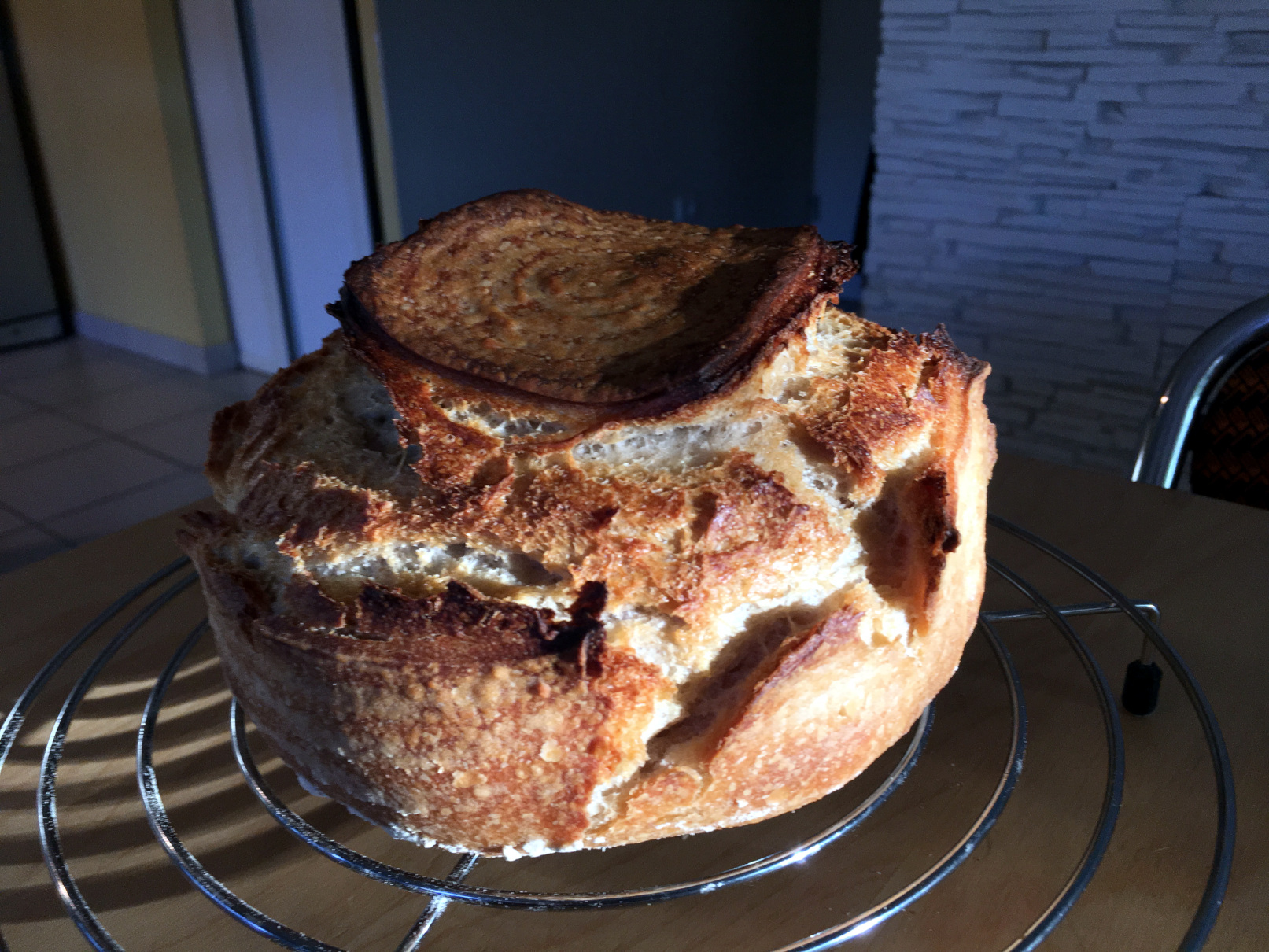Hi everyone,
I am experimenting a bit with the Pain Naturel from the Weekend Bakery. Today replaced 10% of the flour with light rye flour. After the 150 minutes of bulk fermentation the dough felt different than the two previous bakes with only white-wheat flour. It felt weaker and shaping was more difficult. Difficult in a way that it feels that the outer skin of the dough will tear if you try to tighten it a tiny bit more, even-though the dough still feels a bit slack and could use a bit more tension. It reminded a little of when my starter was behaving badly and turned my doughs to sticky pools of goo, but not as extreme. I was certainly ably to get it tighter before. But for all I know it might behave just the way it is supposed to behave.
Could the 10% rye somehow have affected the fermentation? Accelerating it? I remember reading on TFL that adding 5-10% rye should only affect the flavour, not the dough structure?
Except for exchanging 10% of the flour with light rye flour I followed the recipe to the letter. Room temp is 22.5 deg. C and the dough temp. directly after kneading was 25.8 deg. C.
It is now waiting in its basket to be baked tomorrow morning. I also planned to bake the normal version again on Saturday morning, so I will know if the dough feels as before tomorrow.
Thanks in advance,
-François
Yes, rye accelerates things, especially at warmer temperatures. Are you controlling temps with a proofing box, or is it just the temp of the room?
Even 10% rye will accelerate the dough noticeably. Rye has weak gluten, but you're right, at 10%, its not the issue.
If you were able to shape the dough, your loaf should be fine, but it will be more lacy and overproofed looking than normal, I'll bet. Are you stretch and folding throughout bulk to check the development?
on the overnight proof, it may be ready for the oven much sooner than expected.
A 100% rye dough has superb stretch at 85% hydration, so what I'm saying is that if you feel the need to raise the hydration by a percent or two to prevent tearing, try it along with shortening all rise times to compensate for rye speeding up fermentation. A small squirt of lemon is also helpful with rye in the dough.
Squirt of lemon to increase the acidity? Is this a general thing with ryes?
http://www.thefreshloaf.com/node/33316/lemon-juice-secret
I saw this lemon juice addition on a bag of Roger's Rye in Canada a few years back with slightly more lemon when dealing with high rye doughs.
Many thanks.
Hi BakersRoom and Mini Oven,

No, I am not using a proofing box I'm afraid. I wish I had one though. It is getting near summer now here in Toulouse so my apartments temperature will gradually increase now from 22-23 deg. C to about 32 in the summer. I suppose this is going to cause problems during bulk fermentation. But that is a problem for later.
The bread baked fine this morning, although, as you already predicted, it came out slightly more dense. Not superdense like a real over-fermented and badly shaped dough, but just denser than usual. The crumb holes-size distribution was leaning more to a bimodal one with very big holes and tiny ones. Here is what it looks like
Compared to the unmodified one from Wednesday

So, at 10% the rye will accelerate fermentation but it is not going to directly affect the total amount of gluten in the dough? Is that what you meant? If so, maybe I can shorten the bulk fermentation by a third.
Or maybe I can decrease the final dough temperature after kneading a few degrees to 22-23 deg. C. I will have to try. Or lower the inoculation in the poolish. Maybe let the poolish ferment shorter? Or is that overcomplicating things?
Mini Oven, would you add the few percent extra hydration because of the larger water absorption of the rye, or to make the dough more extensible? I had some ripping of the gluten membrane before after the pre-shape. You think this was due to too low hydration or because of over-fermentation where the dough becomes too extensible, but lacks elasticity?
Currently reading Hamelan's Bread about this. Very interesting indeed! As a side note, if you know any literature specifically about dough development I would be happy to know.
Lemon juice? I'm a bit confused about that. Some sources say that the added acids from the LAB's (or lemon?) increase the dough strength (elasticity?) but other sources say that acids attack the gluten network. This seems conflicting information to me?
As always, your input is much appreciated :)
Have a great day!
-François
At 10%, there is a negligible effect on the gluten. But yes, shorten the bulk, I think that is the key to solving this problem. Maybe not by 1/3, maybe try 1/4 first.
Don't mess with temps and innoculation size until you try shortening the bulk, as yes that is a more complicated solution.
I think the ripping during shaping is due to the overproof, but it never hurts to add a little extra water if you're using some whole grain flour. It counteracts the tendency for whole grain to make the dough dense.
Trevor Wilson has a book you can get online called Open Crumb Mastery. Excellent book. Your bread looks good either way!
sharon